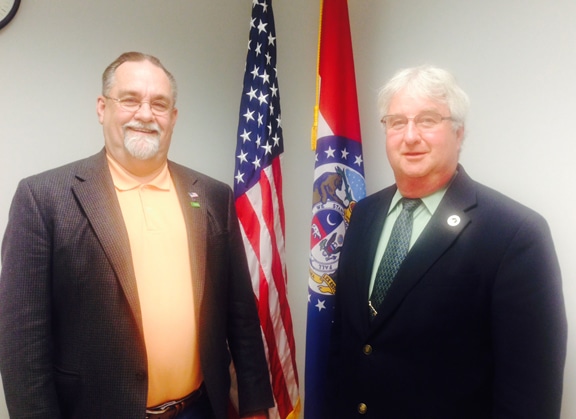 WASHINGTON –U.S. Sens. Patty Murray (D-Wash.) and Susan Collins (R-Maine), chair and ranking member of the Senate Appropriations Subcommittee for Transportation, respectively, June 17 introduced a bill that would authorize a new Short Line Rail Safety Institute to enhance the safety practices and culture of short line railroads. There are 550 short line railroad companies that operate over 50,000 miles of track, or nearly one third of the national railroad network. The tracks can be as short as two miles or up to more than 1,000 miles long.
WASHINGTON –U.S. Sens. Patty Murray (D-Wash.) and Susan Collins (R-Maine), chair and ranking member of the Senate Appropriations Subcommittee for Transportation, respectively, June 17 introduced a bill that would authorize a new Short Line Rail Safety Institute to enhance the safety practices and culture of short line railroads. There are 550 short line railroad companies that operate over 50,000 miles of track, or nearly one third of the national railroad network. The tracks can be as short as two miles or up to more than 1,000 miles long.
The legislation introduced by Sens. Collins and Murray would authorize funding to support grants for research, development, evaluation, and training efforts.
“Whether a train is carrying crude oil on a major rail line or on a short, local route through small towns across America, we need to make sure everyone is safe, both on the train and near the tracks,” Senator Murray said. “We need to have the right policies in place to prevent accidents and respond to emergencies wherever they happen, and establishing a Short Line Rail Safety Institute is a strong step in the right direction.”
“The horrific derailment that occurred in Lac-Megantic, Quebec, last year – just 30 miles from the Maine border – brought to light the importance of ensuring the safe transportation of energy products,” Senator Collins said. “We must ensure that we are taking the necessary steps to prevent another Lac-Megantic, while not overburdening an industry that has a proven track record of safety.”
The new Short Line Rail Safety Institute would:
- Assess the operations and safety programs of short line railroads;
- Develop best practices and work with short lines to implement these practices;
- Provide professional on-site safety training for short line employees;
- Purchase and utilize safety training assets (such as locomotive simulators);
- Assist FRA in implementing its railroad R&D and outreach programs, and tailor such programs for short line railroad operations; and
- Help improve safety culture, including a reduction in the frequency and severity of injuries and incidents, as well as improved compliance with regulatory requirements.
On May 15, the two senators sent a letter to U.S. Department of Transportation Secretary Anthony Foxx expressing support for the creation of such an institution.
“As we discussed when you testified before our Subcommittee, there is no silver bullet to improving rail safety. It is a complicated multi-faceted issue involving prevention, mitigation, and response aspects,” the Senators wrote in the May 15 letter. “The proposed Short Line Railroad Safety Institute could be an important part of the larger solution and would help improve the safe transportation of crude oil and other hazardous materials.”
The bill follows an April hearing held by Murray and Collins to specifically focus on safety issues related to rail shipment of crude oil. Secretary Foxx, National Transportation Safety Board Chairman Deborah Hersman, Director of the Seattle Office of Emergency Management Barb Graff, and Rangeley, Maine, Fire Chief Tim Pellerin, who led emergency response efforts after a train carrying crude oil derailed in Lac-Megantic, Quebec, in 2013, each testified at that hearing.
 WASHINGTON – Even as millions of baby boomers approach retirement, the Social Security Administration has been closing dozens of field offices, forcing more and more seniors to seek help online instead of in person, according to a congressional report being released Wednesday.
WASHINGTON – Even as millions of baby boomers approach retirement, the Social Security Administration has been closing dozens of field offices, forcing more and more seniors to seek help online instead of in person, according to a congressional report being released Wednesday.


 Judge Peter Economus of the U.S. District Court for the Southern District of Ohio ruled Wednesday, June 11 in favor of a motion for summary judgment to permanently maintain the final three days of early voting.
Judge Peter Economus of the U.S. District Court for the Southern District of Ohio ruled Wednesday, June 11 in favor of a motion for summary judgment to permanently maintain the final three days of early voting.